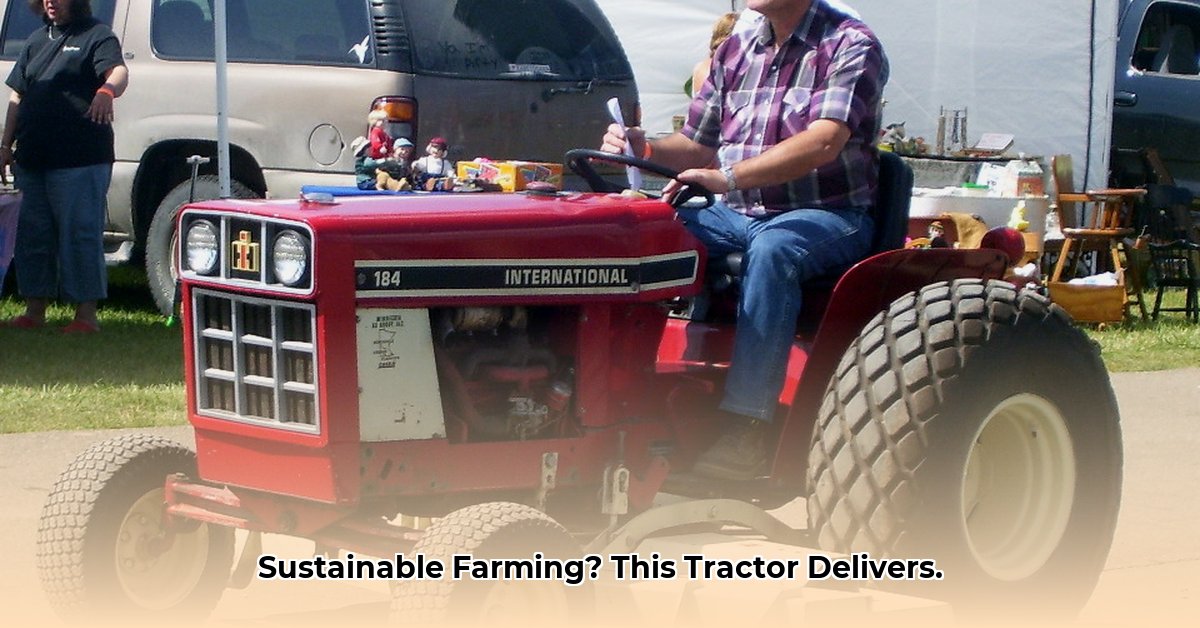
184 International Tractor: A Sustainable Farming Workhorse?
The International Harvester 184 Lo-Boy, a classic compact tractor, presents a compelling case study in sustainable agriculture. This review examines its suitability for modern farming practices, balancing its historical charm with the demands of environmentally conscious agriculture. For comparison, consider the specs of a larger model like the International 464.
Power and Performance: A Closer Look
This compact tractor offers an 18-horsepower engine (though this can vary slightly depending on the specific model year), sufficient for numerous small-scale farming tasks. Its 64-inch wheelbase significantly enhances maneuverability, minimizing soil compaction – a crucial factor for sustainable soil health. The three-point hitch system allows for versatile attachment of implements, including tillers, mowers, and light hauling equipment. This adaptability makes it a true jack-of-all-trades for smaller farms.
Fuel Efficiency and Environmental Impact: A Balancing Act
Fuel efficiency is paramount in sustainable agriculture. While precise fuel consumption per acre data is scarce for the 184 Lo-Boy, its lower horsepower compared to modern tractors suggests potentially lower overall fuel usage. However, its older engine technology lacks the fuel-saving features of modern counterparts. Reliable emissions data is also limited, requiring further research to fully assess its environmental impact. The question remains: does the potential fuel economy outweigh the limitations of older technology?
Maintenance and Repair: The Hidden Costs
Maintaining older machinery presents challenges. Parts for the 184 Lo-Boy can be difficult to source, potentially increasing repair costs and downtime. Finding mechanics familiar with this vintage tractor may also prove challenging. Prospective buyers must carefully consider these potential expenses and the availability of both parts and skilled repair services. Is the risk of extended downtime acceptable?
Cost-Benefit Analysis: The Numbers Game
The initial purchase price of a used 184 Lo-Boy is typically lower than that of a new compact tractor. However, unforeseen repairs and part replacements can quickly erode these savings. A comprehensive cost-benefit analysis is essential. This involves calculating the purchase price, fuel costs, projected maintenance expenses, potential downtime, and the tractor's projected lifespan. This information can then be directly compared to the total cost of ownership for a more modern alternative.
Comparing the 184 to Modern Compact Tractors
Modern compact tractors often feature fuel-efficient engines, advanced technologies (such as GPS guidance and precision farming tools), and improved ergonomics. While the 184 Lo-Boy offers ruggedness and versatility, modern tractors generally provide superior efficiency and a reduced environmental footprint. However, the 184's affordability remains a crucial advantage, particularly for farmers with limited budgets. A thorough price comparison, encompassing both short-term and long-term costs, is critical for informed decision-making.
Sustainability: A Broader Perspective
Sustainable agriculture necessitates a holistic approach, encompassing both economic and environmental considerations. While the 184's lower horsepower translates to reduced fuel consumption compared to larger tractors, its age and potential lower operational efficiency compared to newer models need careful evaluation. Coupled with potential parts sourcing issues, its long-term environmental impact requires a comprehensive life-cycle assessment for a complete picture.
Recommendations for Sustainable Farmers
Before purchasing an International Harvester 184 Lo-Boy:
- Assess Needs: Does the tractor's capabilities align with your farming style and operation size?
- Verify Parts Availability: Research parts availability and repair costs in your region before committing to a purchase.
- Compare Total Costs: Conduct a thorough cost-benefit analysis, considering fuel, repairs, and potential downtime across its lifespan.
- Prioritize Sustainability: Evaluate the tractor's environmental impact comprehensively, considering fuel efficiency, emissions, and its overall life cycle.
The suitability of the International Harvester 184 Lo-Boy for sustainable farming depends heavily on a thorough evaluation of individual circumstances and resources. It can be a viable option for certain farmers, but not for all. Careful planning and a realistic assessment are paramount.